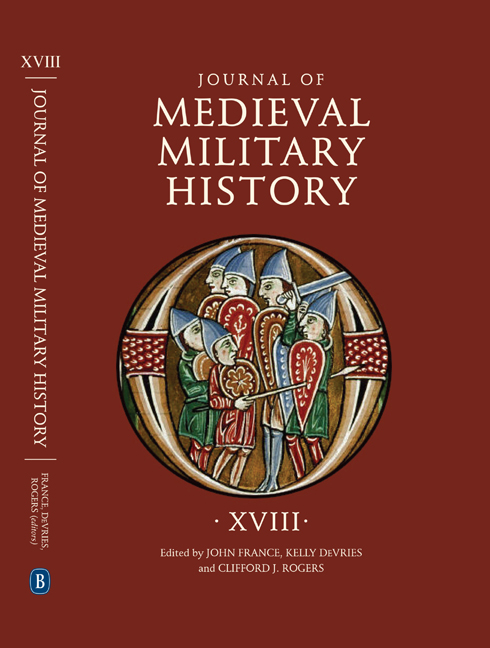Book contents
- Frontmatter
- Contents
- List of Illustrations
- 1 The Eastern Campaigns of King Henry II of Germany, 1003–17
- 2 Peace, Popular Empowerment and the First Crusade
- 3 The Transformation of Naval Warfare in Scandinavia during the Twelfth Century
- 4 Auxiliary Peoples and Military Reform on Hungary’s Western Frontier in the Thirteenth Century
- 5 What Types of Sources Did Medieval Chroniclers Use to Narrate Battles? (England and France, Twelfth to Fifteenth Centuries)
- 6 Experimental Tests of Arrows against Mail and Padding
- 7 Four Misunderstood Gunpowder Recipes of the Fourteenth Century
- 8 The Earliest Middle English Recipes for Gunpowder
- 9 Horses and Horsemen in Fifteenth-Century Siege Warfare, with Particular Reference to the Later Hundred Years War
- 10 Supplying the Army: The Siege of Pisa, 1499
- List of Contributors
- Journal of Medieval Military History 1477–545X
5 - What Types of Sources Did Medieval Chroniclers Use to Narrate Battles? (England and France, Twelfth to Fifteenth Centuries)
Published online by Cambridge University Press: 06 October 2020
- Frontmatter
- Contents
- List of Illustrations
- 1 The Eastern Campaigns of King Henry II of Germany, 1003–17
- 2 Peace, Popular Empowerment and the First Crusade
- 3 The Transformation of Naval Warfare in Scandinavia during the Twelfth Century
- 4 Auxiliary Peoples and Military Reform on Hungary’s Western Frontier in the Thirteenth Century
- 5 What Types of Sources Did Medieval Chroniclers Use to Narrate Battles? (England and France, Twelfth to Fifteenth Centuries)
- 6 Experimental Tests of Arrows against Mail and Padding
- 7 Four Misunderstood Gunpowder Recipes of the Fourteenth Century
- 8 The Earliest Middle English Recipes for Gunpowder
- 9 Horses and Horsemen in Fifteenth-Century Siege Warfare, with Particular Reference to the Later Hundred Years War
- 10 Supplying the Army: The Siege of Pisa, 1499
- List of Contributors
- Journal of Medieval Military History 1477–545X
Summary
Battles are milestones of human history. For the Middle Ages, much more so than for any subsequent period, we rely heavily on the accounts of contemporary historians, as we rarely have many archival records. However, as medieval historians were mainly clerics, they were often misinformed. Even a chronicler fond of chivalric prowess such as Froissart never went to a battlefield himself, and this was the case with many chroniclers. Thus, my aim is to answer a simple question: what types of sources did medieval chroniclers use in order to tell what happened in battles? I shall also offer a classification of these sources and an assessment of their accuracy and significance. First, I will consider the case of testimonies provided by warriors directly involved in combat. The role of the heralds of arms, so often quoted by the chroniclers, will also be studied. Then, I will turn to the use of archival documents, such as letters from kings and generals, and also other types of sources. Finally, I will consider the case of warrior-chroniclers, such as Villehardouin. Their use of personal memories does not necessarily mean that their narratives are more accurate. Like many others, they used many commonplaces and often narrated what should have happened in battles rather than what actually happened.
As deceptively simple as the title of this paper may seem, wide-ranging reflections on the provenance of the information used or contained in chronicles should not be limited to student handbooks. Actually, providing a simple list of sources used for battle narratives proves quite challenging, as each source raises many questions: how was it collected, used, reworked? Why were other documents ignored? Rather than merely providing an enumeration or classification of sources, this paper aims to provide a reflection on the art of medieval historians and on the relative trustworthiness of their works. To answer the question posed in the title, a comprehensive study of sources used in chronicles is indeed impossible. In spite of structural continuities, the four centuries I intend to explore show many evolutions in historical writing. Besides, each chronicle has its own sources and patterns that have to be analyzed carefully. There was no actual historical school in the Middle Ages, nor was there a specific type of education expected of all chroniclers.
- Type
- Chapter
- Information
- Journal of Medieval Military HistoryVolume XVIII, pp. 117 - 142Publisher: Boydell & BrewerPrint publication year: 2020



